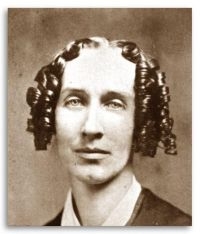 (Host)
(Host)
All this week, VPR celebrates
Women’s History Month with Vermont Women In History, a series of essays on Vermont Women and the
Law. It coincides with the the Vermont Commission on Women’s publication
of the 6th edition of "The Legal Rights of Women in Vermont," a
handbook that explains laws governing issues like employment, domestic
relations, property, housing, government benefits, health, violence, and
immigration. Today many of these laws apply to women and men equally,
but writer, historian and commentator Marilyn Blackwell says that wasn’t
always the case.
(Blackwell) Back in the 1840s reformer Clarina Howard Nichols argued that married women were legally dead.
She complained bitterly that she had no rights to her own clothing and
chided Vermont lawmakers for having "legislated our skirts into their
possession!"
Vermont’s
early laws were based on colonial beliefs about the different
capacities and social roles of men and women. The marriage system
followed the British common law doctrine of coverture, which obligated
husbands to protect and support their families, and in turn they
controlled personal and real property, household labor and wages, legal
contracts, custody of children, and inheritance. Wives held no
individual rights under the law until they became widows. Though single
women could inherit and own property, they needed a male trustee to
represent their legal interests.
By
the early nineteenth century, it became obvious to lawmakers that this
system had its drawbacks; it could leave a family in poverty and
dependent upon the town if a man failed to provide, if he deserted his
family, or if he died.
One of the earliest acts providing wives with individual rights allowed
prisoners’ wives to make legal contracts so they could support
themselves.
 Poverty
Poverty
was the problem that drove Clarina Howard Nichols of Brattleboro to
advocate for married women’s property rights. Her first husband had
spent her inheritance, frustrated her attempts to make a living, and
threatened to take away her children; she had no way to support them and
no legal recourse until she separated from him. Partly as a result of
her newspaper columns about what she called "the wrongs of womanhood,"
legislators passed a bill in 1847 that gave wives certain rights over
their inherited property and allowed them to write wills. According to
Nichols, this was the first inkling of women’s legal existence in
Vermont.
It took more than 40 years for married women to gain
full access to their personal property, earnings, and custodial rights
to their children, but long held beliefs about women’s legal
incapacities persisted into the 20th century. Women were not allowed to
serve on juries, for example, until 1943. Legal reforms in the 1970s and
1980s, such as no-fault divorce, equitable division of marital
property, and custody rules based upon the best interest of a minor
child, further diminished gender-based inequities. Subtle forms of
discrimination in employment, inequitable pay, and sexual harassment
remain difficult to adjudicate, but Clarina Nichols would be pleased
that women are no longer legally dead.